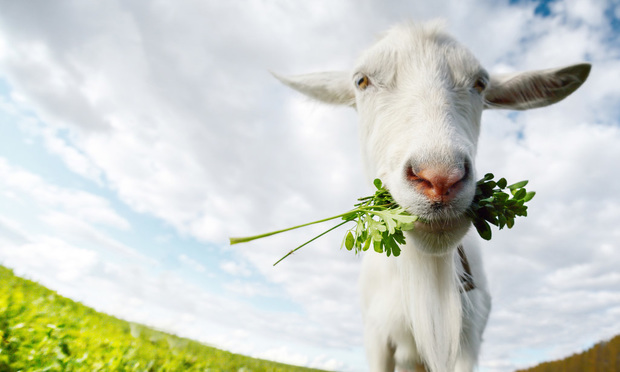Greenberg Traurig, the G.O.A.T. of Law Firms?
The high-powered Am Law 100 firm paid $15,000 for a goat. No, that's not a misprint.
January 05, 2018 at 02:58 PM
3 minute read

Like any of its Big Law rivals, Greenberg Traurig would love to be known as the Greatest of All Time. But the firm can make another boast that most other firms wouldn't challenge: Paying a premium price for a prized goat.
The global legal giant forked over $15,000 for a “reserve grand champion goat” owned by 15-year-old Tara Hummel of Cabery, Illinois, according to a report by the High Plains/Midwest Ag Journal, which covered the recent National Western Stock Show in Denver.
Each year since 1906, the Denver-based Western Stock Show Association has put on the exhibition, which acts as a showcase to promote the classic Western lifestyle and the American agricultural industry.
But what plans does Greenberg Traurig, a fast-growing Am Law 100 firm with its roots in Miami, have for its new goat?
Was the barnyard beast purchased on behalf of a client? Is Greenberg Traurig poised to implement a plan replacing associates and other personnel with low-cost legal goats? If so, how much will the goats charge per hour for their services?
What precautions will the firm take against the goats gobbling up client documents or butting heads with interoffice rivals?
Greenberg Traurig spokeswoman Julie Perry, presented with that high-priority list of questions about the firm's entry into the animal acquisition space, unfortunately confirmed that it will not actually receive the goat it bought. Nor will it send the beast to law school. Instead, Greenberg Traurig has been a longtime sponsor of the National Western Scholarship Trust, which funds scholarships in agriculture and rural medicine at colleges throughout Colorado and Wyoming, Perry said in an email.
At the National Western Stock Show, where the teenage Hummel and her family appear to have a long track record of success when it comes to prize-winning goats, Greenberg Traurig did in fact submit a bid for the animal, a process that is somewhat akin to a corporate sponsorship, Perry said.
The firm spokeswoman noted that the money spent by Greenberg Traurig goes toward supporting junior exhibitors like Hummel, who then raise the award-winning animals as they plan for their agricultural future and college educations.
The average cost of purchasing your own domesticated goat ranges from roughly $75 to $300, depending on certain factors like breed, sex and—perhaps most importantly—temperament. (With a blizzard ravaging much of the northeastern U.S., one would be surprised at the volume of material on the internet available to those mulling the prospect of a goat acquisition. Pygmy and baby goats are cute, but beware the stench of a billy goat, as well as the bone-chilling screams of others.)
No goats were harmed in the reporting of this story.
This content has been archived. It is available through our partners, LexisNexis® and Bloomberg Law.
To view this content, please continue to their sites.
Not a Lexis Subscriber?
Subscribe Now
Not a Bloomberg Law Subscriber?
Subscribe Now
NOT FOR REPRINT
© 2025 ALM Global, LLC, All Rights Reserved. Request academic re-use from www.copyright.com. All other uses, submit a request to [email protected]. For more information visit Asset & Logo Licensing.
You Might Like
View All
Government Attorneys Face Reassignment, Rescinded Job Offers in First Days of Trump Administration
4 minute read


Trending Stories
Who Got The Work
J. Brugh Lower of Gibbons has entered an appearance for industrial equipment supplier Devco Corporation in a pending trademark infringement lawsuit. The suit, accusing the defendant of selling knock-off Graco products, was filed Dec. 18 in New Jersey District Court by Rivkin Radler on behalf of Graco Inc. and Graco Minnesota. The case, assigned to U.S. District Judge Zahid N. Quraishi, is 3:24-cv-11294, Graco Inc. et al v. Devco Corporation.
Who Got The Work
Rebecca Maller-Stein and Kent A. Yalowitz of Arnold & Porter Kaye Scholer have entered their appearances for Hanaco Venture Capital and its executives, Lior Prosor and David Frankel, in a pending securities lawsuit. The action, filed on Dec. 24 in New York Southern District Court by Zell, Aron & Co. on behalf of Goldeneye Advisors, accuses the defendants of negligently and fraudulently managing the plaintiff's $1 million investment. The case, assigned to U.S. District Judge Vernon S. Broderick, is 1:24-cv-09918, Goldeneye Advisors, LLC v. Hanaco Venture Capital, Ltd. et al.
Who Got The Work
Attorneys from A&O Shearman has stepped in as defense counsel for Toronto-Dominion Bank and other defendants in a pending securities class action. The suit, filed Dec. 11 in New York Southern District Court by Bleichmar Fonti & Auld, accuses the defendants of concealing the bank's 'pervasive' deficiencies in regards to its compliance with the Bank Secrecy Act and the quality of its anti-money laundering controls. The case, assigned to U.S. District Judge Arun Subramanian, is 1:24-cv-09445, Gonzalez v. The Toronto-Dominion Bank et al.
Who Got The Work
Crown Castle International, a Pennsylvania company providing shared communications infrastructure, has turned to Luke D. Wolf of Gordon Rees Scully Mansukhani to fend off a pending breach-of-contract lawsuit. The court action, filed Nov. 25 in Michigan Eastern District Court by Hooper Hathaway PC on behalf of The Town Residences LLC, accuses Crown Castle of failing to transfer approximately $30,000 in utility payments from T-Mobile in breach of a roof-top lease and assignment agreement. The case, assigned to U.S. District Judge Susan K. Declercq, is 2:24-cv-13131, The Town Residences LLC v. T-Mobile US, Inc. et al.
Who Got The Work
Wilfred P. Coronato and Daniel M. Schwartz of McCarter & English have stepped in as defense counsel to Electrolux Home Products Inc. in a pending product liability lawsuit. The court action, filed Nov. 26 in New York Eastern District Court by Poulos Lopiccolo PC and Nagel Rice LLP on behalf of David Stern, alleges that the defendant's refrigerators’ drawers and shelving repeatedly break and fall apart within months after purchase. The case, assigned to U.S. District Judge Joan M. Azrack, is 2:24-cv-08204, Stern v. Electrolux Home Products, Inc.
Featured Firms
Law Offices of Gary Martin Hays & Associates, P.C.
(470) 294-1674
Law Offices of Mark E. Salomone
(857) 444-6468
Smith & Hassler
(713) 739-1250










